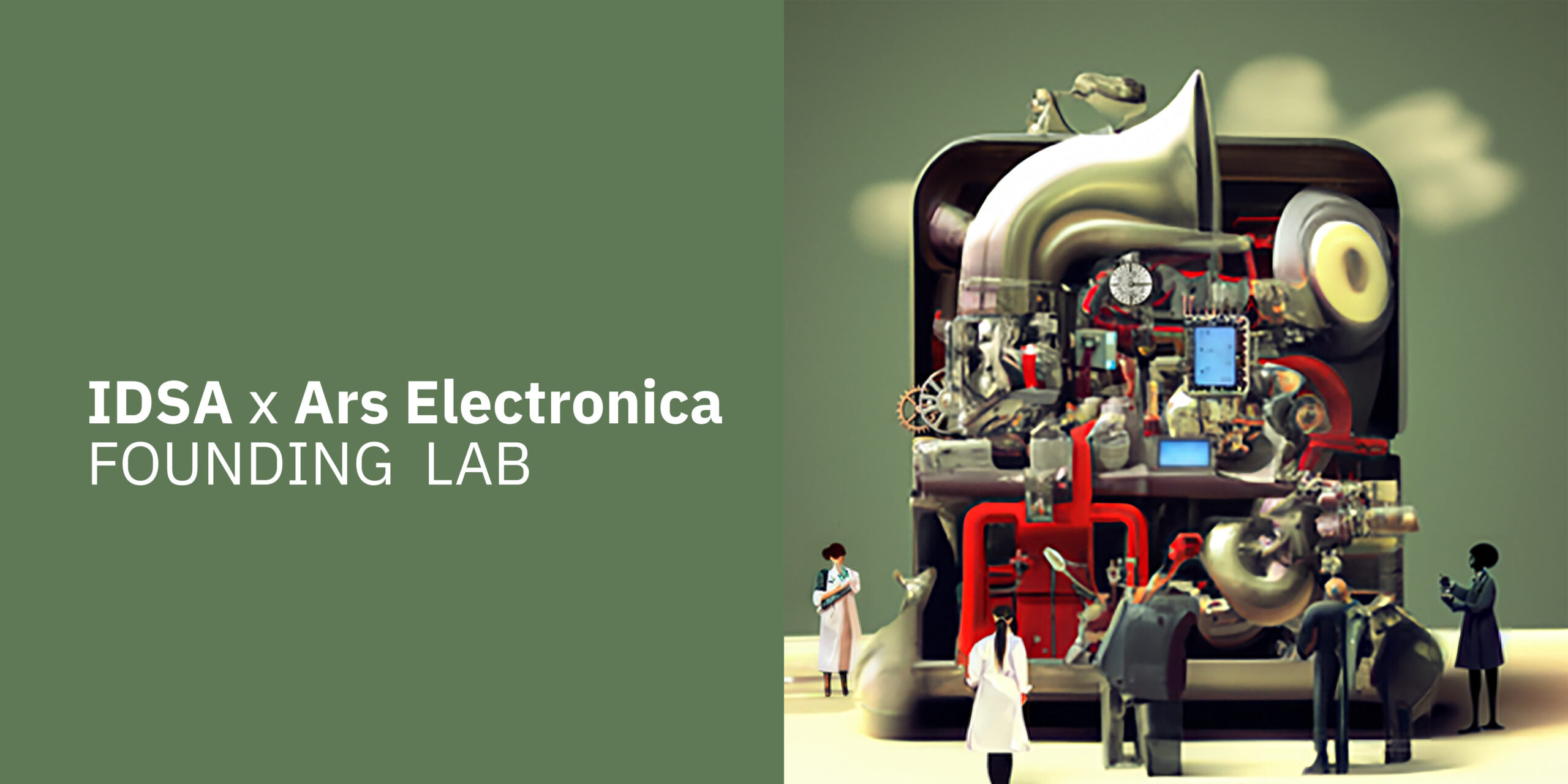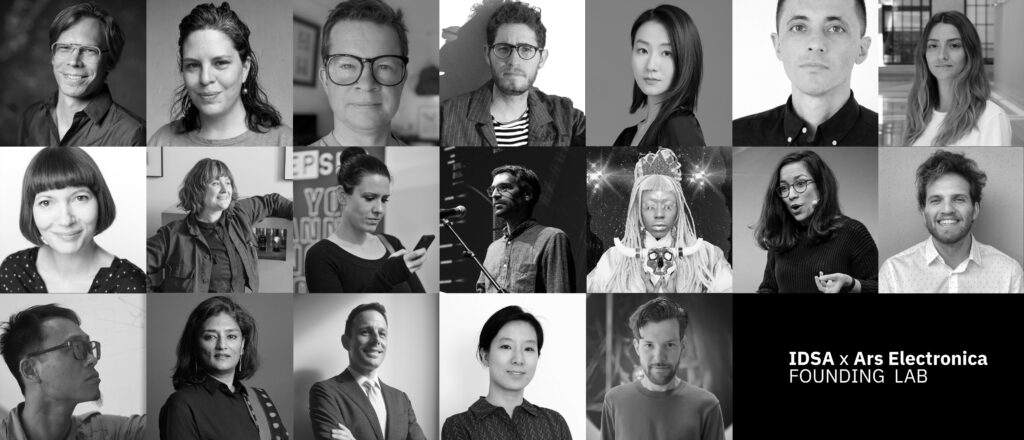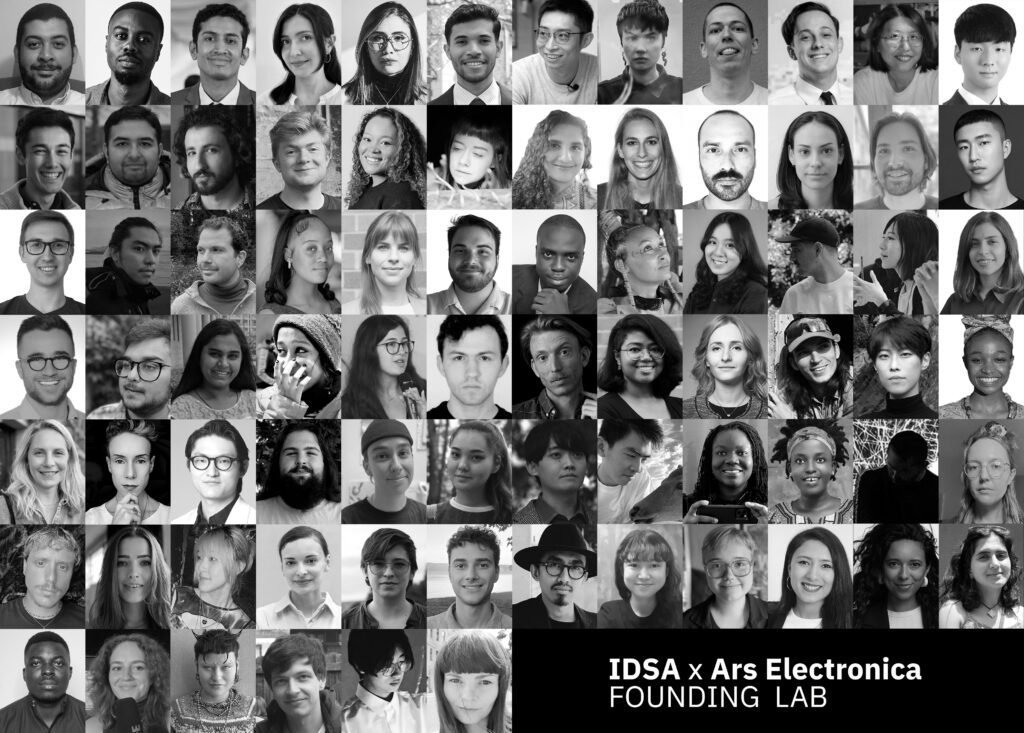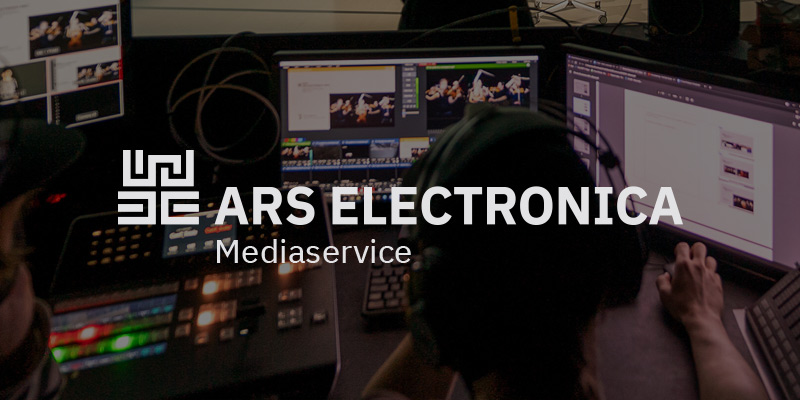75 students, 20 Fellows, and a new university
- Press release as PDF
- More about FOUNDING LAB / about FOUNDING LAB Summer School / about FOUNDING LAB Forum / about FOUNDING LAB Fall Term
- Photos via Flickr
- Ars Electronica Festival 2023
(Linz, August 24, 2023) With the Institute of Digital Sciences Austria—IDSA—a university is being created in Linz that is dedicated to all dimensions of the digital transformation and is breaking new ground in the process. The founding president of the IDSA, Stefanie Lindstaedt, is thus establishing a university that is unique in its interdisciplinary approach, at least in the German-speaking world. The inspiration for the content, didactic and strategic design of this university will come from innovators who are already thinking about and shaping the future across the boundaries of disciplines, industries, countries, and cultures. With the FOUNDING LAB, IDSA and Ars Electronica are bringing these pioneers to Linz.
Looking Back: Open Calls Generate High Interest
In early June 2023, Ars Electronica issued two Open Calls—one for students, one for Fellows. Both ran for just under four weeks, and the response was huge. “We received 338 applications from students in 78 countries and 205 applications from Fellows in 50 countries. For us in Linz, this is a chance to get to know very different perspectives and thoughts and to develop a fundamental conception, that is as open, dialog-oriented, transparent and inclusive as possible,” says Gerfried Stocker, Artistic Director of Ars Electronica. Stefanie Lindstaedt adds: “Being able to help shape a new university for digital transformation is clearly an offer that appeals to creative minds around the world. In our strategy process, we will synthesize the ideas and concepts of these pioneers with the needs of the economy and the role models from around the world.”
75 students from 43 countries …
… will participate in the FOUNDING LAB and attend the SUMMER SCHOOL up to September 10. They’ll be addressing core issues of the digital transformation and developing their shared vision for the IDSA. Veronika Liebl, who as Managing Director of the Ars Electronica Festival is also in charge of the FOUNDING LAB, is looking forward to the results: “We’re hosting top students from all over the world. These young scientists and artists are working and researching at institutions like Cambridge University, the University of Pennsylvania, the MIT Media Lab in Boston, the Royal College of Art in London, or the University of Cape Town.” The range of their research areas reflects the diversity of digital transformation and spans architecture, biotechnology, computational arts, data science, design, history and heritage, food safety, media arts, medicine, human-computer interaction, economics, product design, law, robotics, autonomous systems, and techno-anthropology.
The SUMMER SCHOOL …
… lasts three weeks. During the first week, students deal intensively with the interplay of nature, technology, and humans, focusing on the analysis of structures and systems and the recognition of interrelationships. In the second week, they take stock of the digital transformation: What are the sources of our information? Which lobbies and structures influence public opinion? What are the frictions between technology and human values? Questions about the ownership of knowledge and data will be examined, as well as the role of universities in the creation of new knowledge. The third and final week will be dedicated to the preparation and presentation of the answers and questions developed.
Topic Groups & Topic Group Workshops
SUMMER SCHOOL students are divided into six groups (Topic Groups), each focusing on one of the following topics: Future Materials & New Design Paradigms, Creative Robotics, Biotechnology & arts, Signal detection & Interactivity, Brain-Computer Interfaces and Machine Learning / AI / Data Bias. These topics will be explored in detail in the mandatory Topic Group Workshops led by Matthew Gardiner (Folding the Future: Materials and Design Strategies for Origami Robotics), Johannes Braumann and Amir Bastan (GAZE: About Looking and Being Looked At), Charlotte Jarvis and Patricia Saragüeta (Wet & Sexy: Bioart, Creative Activism and a Collaborative Uterus), Miller Puckette (Sensing, Signal Detection, and Interactivity), Christoph Guger and Anouk Wipprecht (NeuroTech Workshop – Creating Interactions using a Brain-Computer Interface), and Sarah Ciston (Is Another World Possible? AI against the Grain).
Elective Workshops
In addition to the Topic Group Workshops, students can participate in workshops of their own choice. These Elective Workshops are offered by experts such as Andres Colmenares (Designing for Responsible AI in a State of Climate Emergency), Florian A. Schmidt (Prompt Battle Workshop), John Palmesino (ICT for Environmental Causes), Albert Ortig (Entrepreneurship in the Context of AI), Rosanna Fanni (Research, Funding and Politics: A Contradiction in Terms?), Irina Paraschivoiu (Escape Fake), and Karen Palmer (Storyteller of the Future).
Expert Talks & Fireside Chats & Specials & Excursions
The students will also have the opportunity to participate in expert talks, fireside chats, and specials with key figures from the arts, academia, business, politics, and civil society:
They are invited to an expert talk with Federal Minister Martin Polaschek about “The Role of a New University for Digitalization in Strengthening Austria in the European Higher Education Area” and Federal Minister Eleonore Gewessler talks to the students about “The Realities of Policy Negotiations on the European Level – Insights from EU Ministerial Level Negotiations on Transport and Energy Policy Making.” Artist Špela Petrič will explain “How (Not) To Leave the Lab,“ and author and playwright Fabian Scheidler will address the topic “Technology and Power: From the Invention of Writing to AI.” Other expert talks will be offered by Andrés Delannoy, researcher at CERN, Johanna Pirker, member of the founding convention of IDSA, or Petia Niederländer from the Austrian National Bank, among others.
Regina M. Sipos will hold the fireside chat “How we Treat Each Other (Diversity, Inclusion & Mental Health),” Katja Schechtner and Christopher Lindinger will deal with “Careers at the Crossroads of Art, Science, and Business,” and Vanessa Hannesschläger with “Attribution and Ownership of Intellectual Property.“
One of several highlights will be the workshop “IDSA what and how? Inventing the University of the Future” with Stefanie Lindstaedt, Katja Schechtner, Christopher Lindinger, Johanna Pirker and Vanessa Hannesschläger.
In addition, full-day excursions to the Mauthausen Memorial and voestalpine steel works are planned.
Task Forces
SUMMER SCHOOL students don’t just work together in topic groups, but also form task forces with special assignments: the “Demonstrators” design their own exhibition area in POSTCITY – the IDSA x Ars Electronica FOUNDING LAB exhibition area (open from September 6 to 10), the “Presenters” conduct the IDSA Conference Day (September 6), the “Entertainers” perform at the festival’s opening event (also September 6), the “Policy Makers” communicate a “wish list” to politicians (September 10), and the “Reporters” summarize the results of the SUMMER SCHOOL in writing. Stefanie Lindstaedt: “Already in the SUMMER SCHOOL, which is an overture to the FOUNDING LAB, the university’s new interdisciplinary approach is clearly evident: project-oriented work, high flexibility and transparency.”
20 Fellows from 12 countries form the FORUM …
… which will meet from September 6 to 10 as an integral part of the Ars Electronica Festival. Based on the findings of the SUMMER SCHOOL, the Fellows will discuss which topics, learning and teaching methods and strategies could define the new university in Linz. At the same time, the Fellows outline the six subject areas that will be researched at IDSA in the fall semester: Infrastructure, Data & Code, Robots & Tangibles, Interfaces & Visualizations, Media and Digital Society.
“Renowned experts including Paolo Cirio, Roland van Dierendonck, Ziv Epstein, Gerhard Grimm, Darsha Hannah Hewitt, Vladan Joler, Julia Kloiber, Sarah Kriesche, RAY LC, Jiabao Li, Barbara Lippe, David Michael McDonald, Arianna Salazar Miranda, Umlilo Siya, Dietmar Offenhuber, Edwina Portocarrero, Alex Putzer, Kamya Ramachandran, and Nan Zhao are contributing their expertise, creativity, and experience,” says Gerfried Stocker. The 20 Fellows are affiliated with universities such as the University of Texas, the University of Amsterdam and the City University of Hong Kong. They are working and consulting for renowned companies worldwide and writing for media like the Wall Street Journal, the MIT Technology Review Germany and the Australian Broadcasting Corporation (ABC). They are involved in NGOs such as the United Nations or they exhibit their work at the New York Hall of Science, MoMA, the Venice Architecture Biennale, SIGGRAPH and Milan Design Week.
SUMMER SCHOOL & FORUM x Ars Electronica Festival
“Anyone who founds a university today as an ivory tower has not yet arrived in the 21st century,” says Gerfried Stocker. “A university is a place where new knowledge and thus new truths are created. Anyone who conducts research therefore has a responsibility that must be actively assumed. Science and society must be in continuous dialogue and exchange.”
It’s therefore no coincidence that the FOUNDING LAB is closely interwoven with the Ars Electronica 2023 program and is repeatedly seeking contact with the festival audience. In addition to an exhibition area that’s accessible on all five days of the festival, there are three formats that explicitly aim to foster exchange in and with a general public:
On Wednesday, September 6 at 11:00 a.m., the Fellows will be officially welcomed and presented in Linz. Right after that, at 11:45 a.m., the FOUNDING LAB conference on the topic of “Communication and Co-Creation of Visions” will begin. To kick things off, students will give keynotes, then introduce the “Topic Groups.” This will be followed by a roundtable with students and Fellows, after which short presentations by international experts will be on the agenda. The conference will conclude with a Policy Meeting.
Also on Wednesday, September 6, at 7:30 p.m., the official Opening of Ars Electronica will take place, this year consisting of two parts. The first part is for invited guests and is all about the IDSA. Federal Minister Martin Polaschek, Provincial Governor Thomas Stelzer, and Mayor Klaus Luger will speak, as will IDSA Founding President Stefanie Lindstaedt and Ars Electronica Managing Director Gerfried Stocker. The keynote address will be delivered by Jimmy Wales, the co-founder of Wikipedia, perhaps the most important website ever to go online. The students of SUMMER SCHOOL will have the last word. Starting at 8:45 p.m., Ars Electronica and IDSA invite everyone to celebrate – part two of the opening event features a series of performances.
Sunday, September 10, marks the end of Ars Electronica 2023 and with it the FOUNDING LAB. At 12:30 p.m., the Fellows will invite you to the closing event at POSTCITY and present their vision for a university that begins now. In Linz.
ANNEX / The Fellows
Paolo Cirio is a conceptual artist, cultural critic, hacker and activist. His work revolves around social issues influenced by technology, media, politics and business. He is deeply involved in topics such as data protection and internet surveillance, artificial intelligence, climate change, finance, intellectual property and militarism.
Roland van Dierendonck is a senior researcher on the *Responsible Applied Artificial InTelligence (RAAIT)* project at the Rotterdam University of Applied Sciences. His work focuses on methods for collaborative design and co-design of responsible AI in living labs that include stakeholders from industry, research, politics, and society.
Ziv Epstein is a computer scientist and designer currently working at Stanford University. He seeks to understand and develop the next generation of social computing tools that counteract misinformation and the attention economy. He also researches the role of algorithms such as newsfeed recommenders and generative AI in online social interactions. His work has appeared in peer-reviewed journals such as *Nature,* *PNAS*, and *Science,* and in high-level computer science conferences such as CHI and CSCW. He is also a practicing multimedia artist whose work has been featured at Ars Electronica, the MIT Museum, and Burning Man.
Gerhard Grimm is an expert in systemic consulting, coaching, moderation, and value-oriented leadership. For more than 25 years he has been advising and supporting specialists and managers in technology-based companies in aligning the use of digital tools with the needs of their customers.
Darsha Hannah Hewitt explores the material aspects of our digital life. Her media-archaeological approach uncovers the embedded power, economic and control structures of technologies and how they affect people and ecosystems.
Vladan Joler is a professor at the Art Academy of the University of Novi Sad and the founder of the SHARE Foundation. He deals with topics such as the transparency of algorithms, the exploitation of digital workers, and the invisibility and opacity of technological infrastructures and black boxes.
Julia Kloiber is CEO and co-founder of Superrr Lab, a feminist technology organization focused on technology in the public interest. She has co-founded pioneering projects such as the Prototype Fund, a public open source fund, and the Code for Germany network. Julia Kloiber is also a member of the Advisory Board of the Federal Government’s Digital Strategy, an integral part of Digital Service 4 Germany and writes a monthly column for the *MIT Technology Review Germany*. She is committed to a just and fair digital future and is constantly looking for innovative ways and solutions to bridge the gap between technology and society.
Sarah Kriesche works as a journalist for the Austrian radio station Ö1 and reports on the progress of IT in industry, business, research, and politics. One of the highlights of her professional career was her work on the ORF radio program “Neighbor in Need”, which reported on current events in south-eastern Europe in six languages (on short and medium wave) in 1999. For her series “Diversity in Vienna” (portraits of Viennese people who also have cultural roots in other countries and that show how this cultural togetherness enriches the city and its quality of life), she received the “Prelate Leopold Ungar Recognition Award”. Her contribution “Zeitreise Monitoring” (about the history of surveillance in Austria) was awarded the Hamburg “Surveillance Study Prize” in 2017. She is currently working in the science department of Ö1 on technical innovations and their impact on society.
RAY LC is an Assistant Professor at City University of Hong Kong and Founder of the Narrative Spaces Studio. RAY LC conducts research in the field of neuroscience and human-machine interfaces, creating speculative and multimedia narratives about how we as humans adapt to technology. RAY LC’s work has been exhibited at prestigious venues such as the New York Hall of Science, the New Museum, the Saari Residency, and Ars Electronica.
Jiabao Li is an assistant professor at the University of Texas at Austin, researching climate change and co-creation between species, human technology, and cognition. She works with various media such as wearables, robots, AR/VR, performance, scientific experiments, and installations. Jiabao Li graduated from Harvard University Graduate School Of Design with honors and received several awards including Forbes China 30 Under 30, iF Design Award, Falling Walls, NEA, STARTS Prize, Fast Company, Core77, IDSA, A’ Design Award, Webby Award, and Cannes World Film Festival Best VR (Short) Award. Her works have been presented at international events such as the Venice Architecture Biennale, MoMA, Ars Electronica, SIGGRAPH, Milan and Dubai Design Week, the Museum of Design, and the Alaska State Museum.
Barbara Lippe is a pioneer of the Metaverse and artistically directed one of the first 3D online societies in Europe in the early 2000s. She created avatars and virtual beings in Tokyo before slipping into various characters herself as a professional actress in London. As Head of Curation for Europe’s leading video game industry and VR conferences, she used her extensive network to inspire and motivate. In 2014 she founded an award-winning XR production studio experimenting with drama and story worlds in VR before co-founding Holodeck VR to develop large-scale, multi-user, walk-through VR environments. She has a PhD in Game Studies and lectures around the world.
David Michael McDonald works as a sound designer at the Australian Broadcasting Corporation (ABC) in Sydney. He collaborates with professionals from various fields such as science, art, news, and history to create content for various formats and platforms—including terrestrial and digital radio stations, podcasts, television and apps. In collaboration with Microsoft, he worked on the development of ABC’s synthetic voice using machine learning and used Large Language Models (LLMs) to generate acoustic weather reports for radio.
Arianna Salazar Miranda is a postdoctoral fellow at MIT’s Senseable City Lab and the Mansueto Institute at the University of Chicago. In 2024 she will take up a position as a lecturer in urban planning and data science at Yale University. Miranda holds a PhD from MIT in computational urban science and a master’s degree in urban planning. She also holds a degree in architecture from Veritas University in Costa Rica. Her professional career has taken her into both the private sector and academia, where she has worked at Microsoft Research and the Federal Reserve Bank of Richmond. Arianna’s research integrates design, technology, and data to understand urban sustainability issues. Her contributions have been featured by CNN, *The Guardian*, and the World Economic Forum, and have been published in leading academic journals across disciplines.
Dietmar Offenhuber is an Associate Professor at Northeastern University and holds its Chair in Art and Design with a focus on Information Design and Urban Studies. His research examines the connection between design, technology, and urban governance. He is the author of the award-winning monograph *Waste is Information* (published by MIT Press) and has authored several books on urban data and accountability technologies.
Edwina Portocarrero is a researcher, designer, and educator working at the intersection of art, culture, technology, and social engagement. She was associate director of design research at frog design, a global creative and design consultancy, and co-founder of Super Market, a design and creative technology production and consultancy agency. She earned her master’s and doctoral degrees from the MIT Media Lab, where she developed creative cognition tools that connect ubiquitous computing, network technologies, and sensor networks with the social, aesthetic, and symbolic qualities of the respective environment and environment.
Alex Putzer has taught at the University of Amsterdam and the University of Applied Arts in Vienna. He is currently working on his dissertation on the rights of nature in urban areas at the Sant’Anna School of Advanced Studies. He is collaborating with researchers from MIT Boston, the University of Pennsylvania in Philadelphia and the New School in New York. Alex Putzer is an expert on the *Harmony with Nature Program* for the United Nations and a member of the Global Alliance for the Rights of Nature Academic Hub. As a UNESCO Fellow for Interdisciplinary Anticipation and Global-Local Transformation, he examines how new legal systems can influence urban policy-making.
Kamya Ramachandran is a pioneer in interdisciplinarity and co-creation. She has been involved in various projects, including the reconstruction of earthquake-damaged villages in India (2001), participatory planning in the San Francisco Bay Area (2006), interdisciplinary education of students (2018), and the development of grant programs for female artists and creative technologists (since 2020).
Umlilo Siya is an innovative, cross-genre and cross-gender multidisciplinary artist working in music, fashion, 3D animation, VR, visual arts, and performance. She is the founder of Future Kwaai Records, co-founder of the LeGrand Queer Arts Festival and the fashion label Kwaai Boutique. Her work is rooted in the black and queer experience and seeks to encourage conversation and exchange with local and international communities and artists. She has collaborated with cultural exchange projects and residencies around the world including Brazil, USA, Switzerland, and Germany.
Nan Zhao is a machine learning scientist leading the ML team at Tulip Interfaces, where she uses her expertise to drive the development of AI for manufacturing. Previously, she made important contributions as a researcher at MIT and founded the smart city startup Soofa. Nan’s work seamlessly blends engineering and human-centric design, supported by a PhD in Media Arts and Sciences from MIT and an MSc. in electrical engineering from the RWTH Aachen, where she graduated with honors. Her groundbreaking PhD thesis on responsive environments that harness sensor technology reflects her commitment to shaping a transformative future.
Kontakt
Ars Electronica
Christopher Sonnleitner / Head of Communications Ars Electronica
Tel. +43.664.8126.156 / christopher.sonnleitner@ars.electronica.art
IDSA
Christian Zacharnik/ Head of PR / Corporate Identity Prihoda GmBH
Tel. +43.676.4333731





